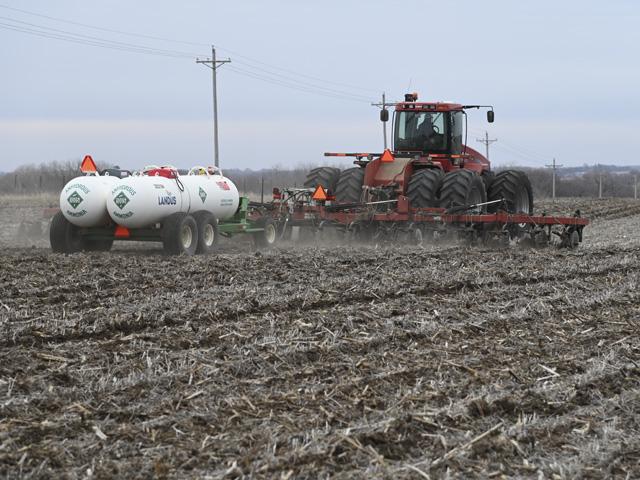Poet, CF Plan Low-Carbon Ammonia Pilot
Poet, CF Industries to Use Low-CO2 Ammonia to Reduce Farm, Ethanol Emissions
LINCOLN, Neb. (DTN) -- The nation's largest ethanol producer and one of the largest ammonia fertilizer companies are developing a pilot project to reduce the carbon intensity of ethanol and corn production using low-carbon ammonia as a fertilizer.
Poet LLC and CF Industries have announced a collaboration that will involve low-carbon ammonia field applications starting possibly in the fall, according to a news release.
The conventional production process of ammonia is emissions intensive, which increases corn ethanol's carbon footprint.
"As a result, ammonia production is a significant contributor to the lifecycle carbon intensity of corn production and thus ethanol production," the companies said.
"Producing ethanol with corn grown using low-carbon ammonia can reduce the carbon intensity of ethanol up to 10%."
The companies are targeting the fall of 2024 for the first applications of low-carbon ammonia with subsequent applications in spring of 2025, with the first crop to be harvested in the fall of 2025.
The companies said they intend to jointly develop a low-carbon fertilizer supply chain to track, validate and certify carbon intensity reduction originating from low-carbon ammonia.
The so-called green ammonia is produced by CF Industries at a plant in Donaldsonville, Louisiana.
P[L1] D[0x0] M[300x250] OOP[F] ADUNIT[] T[]
The lower-carbon ethanol is expected to be produced at Poet's ethanol plants in the following places: Bingham Lake, Minnesota; Emmetsburg, Iowa; Fairmont, Nebraska; and North Manchester, Indiana.
"This includes implementing supply plans with fertilizer retailers serving farms that supply corn to these Poet bioprocessing plants and developing monetization opportunities for farmers who use this low-carbon fertilizer," the companies said in a news release.
The companies said farmers should reach out to their local Poet grain merchandisers for more information.
Green ammonia is produced with hydrogen sourced from an electrolysis-based production process that produces no carbon dioxide emissions but is otherwise identical to commodity ammonia, according to the companies.
CF Industries recently completed installation of a 20-megawatt electrolyzer at its Donaldsonville plant.
"Start-up of the electrolyzer is imminent and the company intends to purchase renewable energy certificates to pair with the start-up to enable green ammonia production," CF Industries said.
CF Industries said it will have additional low-carbon ammonia at the Donaldsonville plant beginning in 2025 when a large-scale carbon capture and sequestration project at the facility begins.
With significant potential for ethanol producers and farmers to supply future sustainable aviation fuel plants with feedstocks, the ethanol industry is tasked with reducing its carbon footprint to become a more viable SAF feedstock.
Christian McIlvain, president of Poet Grain, said the project is important for the company and the farmers Poet works with.
"We want to prepare and educate our corn producers on the realities of the impact of the carbon in their grain," McIlvain said.
"This initiative not only gives producers a low-carbon ammonia option but also provides the opportunity to educate them on their farm's carbon score and what that could mean for their grain value."
Bert Frost, executive vice president, sales, supply chain and market development at CF Industries, said low-carbon fertilizers can play a role in reducing agriculture's carbon footprint.
"Fertilizers manufactured with a lower-carbon intensity provide a quantifiable and certifiable method of decarbonizing bioethanol inputs," he said.
"We look forward to demonstrating these benefits not just for ethanol production but for corn growers as well."
Todd Neeley can be reached at todd.neeley@dtn.com
Follow him on social platform X @DTNeeleyeeley
(c) Copyright 2024 DTN, LLC. All rights reserved.




